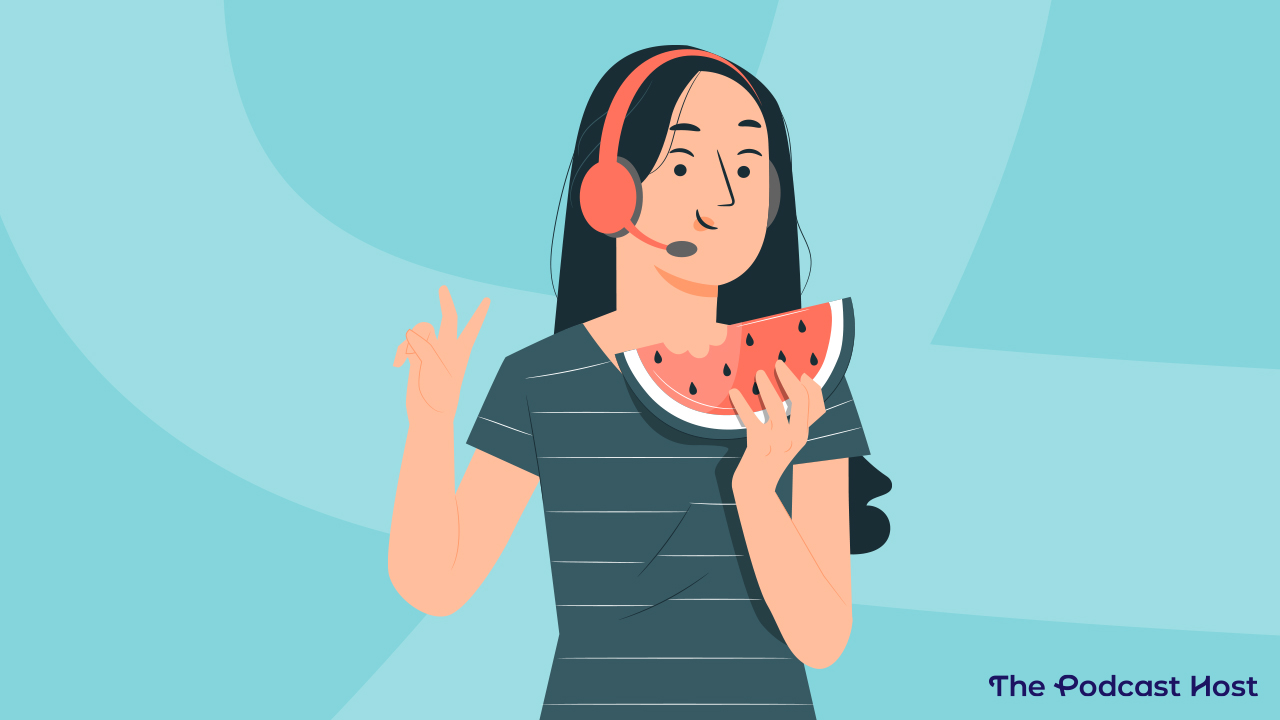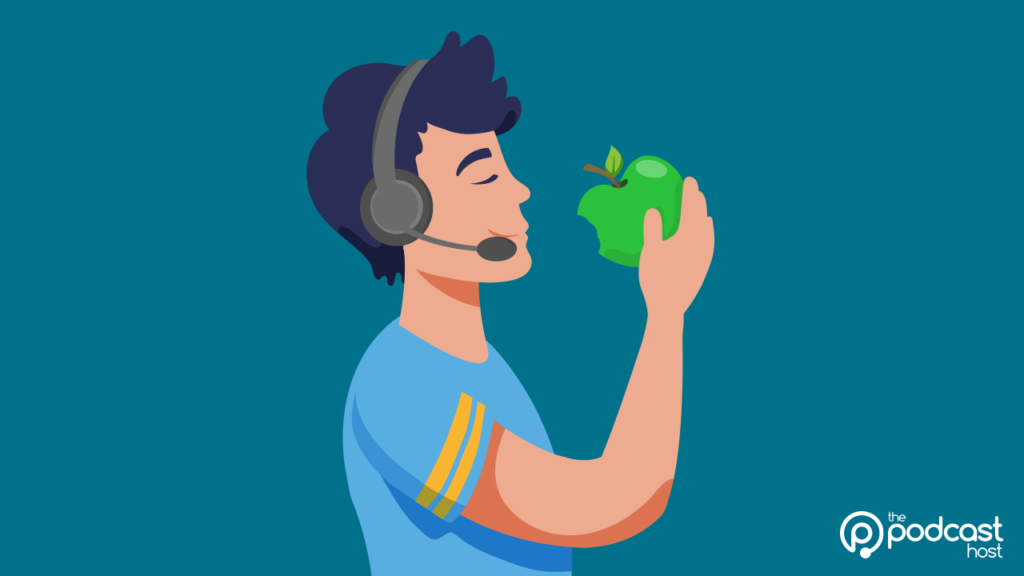Nomcasting! Podcasting Snacks to Fuel Your Creativity & Save Your Voice

Picture this. You’re getting ready for a marathon recording session. You need snacks and beverages that will keep you focused, but creative. You need energy that’s sustainable and doesn’t set you up for a crash. And, you need to avoid mouth noises. In this article, we’ll look at some suggestions for podcasting snacks to help you feel good and sound great.
Caveat Emptor: This Is Not Nutrition Advice
Remember how I keep telling you that I’m not a lawyer, and I’m not a sound engineer? I’m also not a nutritionist. Food allergies, dietary restrictions, and cultural preferences come first. Eat what you like. These are suggestions, not magic potions.
Why Should I Care About Podcasting Snacks?
You take extra care to make sure your podcast is just right. By now, you’ve probably learned that planning ahead means less work at the end, when you’re tired. One of the simplest ways to avoid extra work in the editing stage is to make sure you’re prepared to work. When you think about podcasting snacks as “the fuel you put in your tank,” you can perform better in the long run.
I’ve seen voice actors show up to recording sessions with a six-pack of beer. I’ve been the producer who supplies pizza, soda and coffee, to find the crew and talent getting tired and short-tempered. Food and drink matter.
Avoid Mouth Noises
Mouth noises and clicks are a prevalent podcasting concern. You can do your best to hydrate, but what you eat affects your mouth too. Salty foods can dry out your mouth, resulting in sticky sounds. Anything that dries out your vocal cords (alcohol, carbonation, caffeine) is a bad idea.
Acid reflux, caused by dairy, fried foods, caffeine, and allergens, can thicken the vocal folds and make you sound hoarse.
Energy Bombs
Have you ever babysat a kid who’s had too much breakfast cereal? Or, have you sat down with a big delicious latte to study for a test, only to find yourself even more tired? Simple carbohydrates (as opposed to complex carbs) cause a quick spike in blood sugar and energy levels, followed by tiredness. They’re easily digested and often cheap. But, they’ll cost you in the long run in terms of brain fog.
So, What Are Some Good Podcasting Snacks?
You have to have something for fuel. Particularly when you’re in a situation where you have friends over to record, you want to have some kind of a snack spread. Craft services are an important part of the film industry for a good reason. Here are some ideas for good snacks to have on hand for marathon recording sessions.
Nuts and Seeds
Nuts have complex carbohydrates for sustainable energy, plus fibre and vitamins. Many people are allergic to peanuts, so if you choose mixed nuts or trail mix, check to make sure the blend is peanut-free. Almonds and sunflower seeds are high in Vitamin A, reputed to be good for vocal health. Whether this is true or not, I can’t tell. Tell yourself it is, and it’ll boost your confidence.
Fresh Fruit and Vegetables
Yes, fruit has sugar, and we talked about sugar being a bad idea. Again, processed sugar is a bad idea. The vitamins and fibre present in whole foods tend to outweigh the sugar. At least, that’s what my mom says, and she’s pretty smart.
Citrus fruits, though, are an exception. Citric acid can dry out your vocal cords. A squirt of lemon in your tea or water is a good idea. Chowing down on a sack of satsumas is another.
Green apples have been a favourite snack among vocal artists for years. Reportedly, the malic acid in green apples helps flush away mucus and clean the mouth.
Bell peppers and carrots are inexpensive, packed with vitamins, and easily sliced up to serve.
A bowl of green apples, paired up with a bunch of grapes and some sliced raw veggies, is a podcasting snack spread that shows your co-host you care enough to treat them like Oprah Winfrey.

Protein
Provided you’re not a vegetarian or vegan, lean meats such as chicken or fish are a good energy solution. Use herbs for seasoning (like one of those Italian seasoning blends) so you don’t have to rely on salt. Some good options for a meal break are:
- Broiled or oven-baked chicken kabobs
- Italian tuna salad: no mayo, less throat mucus.
Beverages
As we’ve said before, small sips of room-temperature water while working keeps your mouth from becoming sticky and help you stay hydrated. Herbal or decaffeinated tea is another good choice to keep on hand, along with apple juice.
Liquorice?
Found in many decaffeinated teas and in lozenges, liquorice can soothe throats and may reduce acid reflux. Its demulcent properties may protect your vocal cords. But, many liquorice-flavoured products actually contain anise, which has a similar taste without the reputed health benefits of liquorice root. Consuming lots of liquorice can lead to increased blood pressure and problems with heart and kidney disease. Having some on your podcasting snack tray isn’t a bad idea, but don’t rely on it as a magic throat-saver.
Podcasting Snacks: They’re Part of Planning Ahead
Delicious, healthy snacks are part of the investment you make in yourself. When you take your podcast seriously, treat yourself right, and plan ahead, you increase your confidence. Your podcast will sound better, and your audience is more likely to share your episodes. When you’re finished recording, crack open a tub of ice cream and a bottle of wine, because it’s fun.
